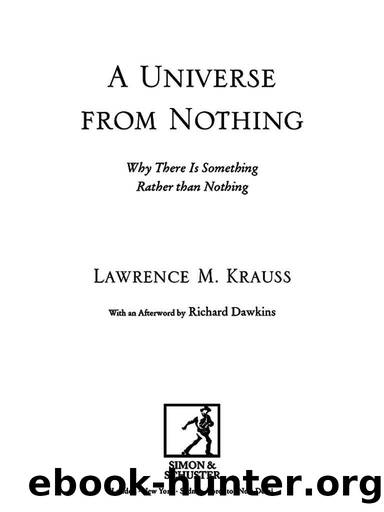A Universe From Nothing by Lawrence M. Krauss

Author:Lawrence M. Krauss [Krauss, Lawrence M.]
Language: eng
Format: mobi
ISBN: 9781471112690
Publisher: Simon & Schuster UK
Published: 2012-09-12T23:00:00+00:00
CHAPTER 7
OUR MISERABLE FUTURE
The future ain’t what it used to be.
—YOGI BERRA
In one sense it is both remarkable and exciting to find ourselves in a universe dominated by nothing. The structures we can see, like stars and galaxies, were all created by quantum fluctuations from nothing. And the average total Newtonian gravitational energy of each object in our universe is equal to nothing. Enjoy the thought while you can, if you are so inclined, because, if all this is true, we live in perhaps the worst of all universes one can live in, at least as far as the future of life is concerned.
Remember that barely a century ago, Einstein was first developing his general theory of relativity. Conventional wisdom then held that our universe was static and eternal. In fact, Einstein not only ridiculed Lemaître for suggesting a Big Bang, but also invented the cosmological constant for the purpose of allowing a static universe.
Now, a century later we scientists can feel smug for having discovered the underlying expansion of the universe, the cosmic microwave background, dark matter, and dark energy.
But what will the future bring?
Poetry . . . of a sort.
Recall that the domination of the expansion of our universe by the energy of seemingly empty space was inferred from the fact that this expansion is speeding up. And, just as with inflation, as described in the last chapter, our observable universe is at the threshold of expanding faster than the speed of light. And with time, because of the accelerated expansion, things will only get worse.
This means that, the longer we wait, the less we will be able to see. Galaxies that we can now see will one day in the future be receding away from us at faster-than-light speed, which means that they will become invisible to us. The light they emit will not be able to make progress against the expansion of space, and it will never again reach us. These galaxies will have disappeared from our horizon.
The way this works is a little different than you might imagine. The galaxies do not suddenly disappear or twinkle out of existence in the night sky. Rather, as their recession speed approaches the speed of light, the light from these objects gets ever more redshifted. Eventually, all their visible light moves to infrared, microwave, radio wave, and so on, until the wavelength of light they emit ends up becoming larger than the size of the visible universe, at which point they become officially invisible.
We can calculate about how long this will take. Since the galaxies in our local cluster of galaxies are all bound together by their mutual gravitational attraction, they will not recede with the background expansion of the universe discovered by Hubble. Galaxies just outside our group are about 1/5000th the distance out to the point where the recession velocity of objects approaches the speed of light. It will take them about 150 billion years, about 10 times the current age of the universe, to get
Download
This site does not store any files on its server. We only index and link to content provided by other sites. Please contact the content providers to delete copyright contents if any and email us, we'll remove relevant links or contents immediately.
Turbulence by E. J. Noyes(7031)
Tools of Titans by Timothy Ferriss(6929)
Astrophysics for People in a Hurry by Neil DeGrasse Tyson(4612)
Room 212 by Kate Stewart(4097)
Pale Blue Dot by Carl Sagan(3993)
The David Icke Guide to the Global Conspiracy (and how to end it) by David Icke(3874)
Secrets of Antigravity Propulsion: Tesla, UFOs, and Classified Aerospace Technology by Ph.D. Paul A. Laviolette(3423)
Apollo 8 by Jeffrey Kluger(3196)
Losing the Nobel Prize by Brian Keating(3182)
A Journey Through Divination and Astronomy by Publishing Pottermore(3011)
Goodbye Paradise(2946)
COSMOS by Carl Sagan(2944)
Brief Answers to the Big Questions by Stephen Hawking(2871)
How to Read Water: Clues and Patterns from Puddles to the Sea (Natural Navigation) by Tristan Gooley(2843)
The Five People You Meet in Heaven by Mitch Albom(2831)
The Order of Time by Carlo Rovelli(2707)
How to Read Nature by Tristan Gooley(2656)
A Brief History of Time by Stephen Hawking(2468)
Aliens by Jim Al-Khalili(2374)
